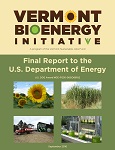 The purpose of the Vermont Bioenergy Initiative (VBI) was to foster the development of sustainable, distributed, small-scale biodiesel and grass/mixed fiber industries in Vermont in order to produce bioenergy for local transportation, agricultural, and thermal applications, as a replacement for fossil fuel based energy.
The purpose of the Vermont Bioenergy Initiative (VBI) was to foster the development of sustainable, distributed, small-scale biodiesel and grass/mixed fiber industries in Vermont in order to produce bioenergy for local transportation, agricultural, and thermal applications, as a replacement for fossil fuel based energy.
The VBI marked the first strategic effort to reduce Vermont’s dependency on petroleum through the development of homegrown alternatives. With billions of gallons of ethanol produced and blended with gasoline each year in the United States—and very little possibility of corn-based ethanol development in Vermont—we focused on a specific subset of bioenergy alternatives:
 We worked with interested farmers to develop on-farm oilseed production, processing, and biodiesel production capacity for farm and local community use, and with researchers to develop the agronomics and economics of oilseed crop and biodiesel production in Vermont.
We worked with interested farmers to develop on-farm oilseed production, processing, and biodiesel production capacity for farm and local community use, and with researchers to develop the agronomics and economics of oilseed crop and biodiesel production in Vermont.
 We worked with interested farmers, entrepreneurs, and researchers to augment Vermont’s woody biomass supply with grass and mixed fiber pellets for thermal applications.
We worked with interested farmers, entrepreneurs, and researchers to augment Vermont’s woody biomass supply with grass and mixed fiber pellets for thermal applications.
 We worked with interested researchers, entrepreneurs, and farmers to develop cold climate algae that could eventually be available for biodiesel production.
We worked with interested researchers, entrepreneurs, and farmers to develop cold climate algae that could eventually be available for biodiesel production.
We developed many tools for understanding Vermont’s bioenergy alternatives,
including:
► the Renewable Energy Atlas of Vermont (relaunched in 2016 as the Community
Energy Dashboard), a map-based website for visualizing existing and potential
renewable energy sites;
► an Oilseed and Biodiesel Production Calculator (downloaded more than 200
times from people in the U.S. and around the world);
► a nine-part video series, Bioenergy Now!— collectively viewed over 89,000
times—that highlights oilseed crop and biodiesel production, grass energy
production, and algae research;
► the VBI website, a repository for all materials developed by the Initiative; and
► content for biomass-to-bioenergy courses offered at the University of Vermont
and Vermont Technical College.
At the beginning of this project, Vermont had very limited experience with the research, feedstocks, production processes, industry networks, and many other factors necessary to develop biodiesel and grass/mixed fiber pellet industries. Our investments in feasibility analyses, research and development, technology and demonstration projects, and education and outreach resources for various bioenergy feedstocks have created a solid foundation for future efforts to build from.





